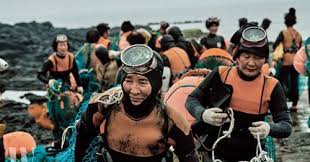Jeju Island and the Fierce Women of the Sea
- Gabrielle Samad
- Nov 6, 2024
- 4 min read
Updated: Nov 8, 2024
November, 2024
This will be a short and sweet post about a very inspiring group of women that I had the opportunity to learn about during our time on Jeju Island, South Korea.
The Haenyeo - women of the sea
해녀

As a kid, I always dreamed of being a marine biologist. I imagined spending my days diving in tropical oceans, surrounded by colorful reefs and exploring the deep unknown. The ocean has always fascinated me and in my childhood eyes a marine biologist’s life seemed magical, a life so free, full of adventure and discovery. As I got older and realized that most of marine biology was lab based research and not the glamorous island hopping and swimming with dolphins that I had once imagined, my childhood dream was quickly squashed. I said goodbye to my seafaring career before it even took off, but until this day, my love for the ocean has always remained. I think this is why I resonated so deeply with the Haenyeo women of the sea. Hearing their stories I felt my childhood wonder ignited again.
The Haenyeo are a group of women free divers from Jeju, a volcanic island 60 miles south of the Korean peninsular. Having a deep connection to the sea, a Haenyeo’s world revolves around the ocean. They are in the water day in and out, rain or shine, harvesting abalone, conch, sea urchins and other creatures of the sea using sustainable practices that date back to the 17th century. Over generations, these women have become experts of the ocean, diving 5-20 meters daily to forage for seafood with one single breath. They then sell their bounty at the local market to provide for their families.
Considering themselves “guardians of the sea,” for generations Haenyeo’s have passed this practice down to their children. Priding themselves in resisting technology, Haenyeo have only adopted wetsuits, flippers and goggles within the last 40 years or so. Previously, they would reach diving sites solely by rowboats, but today they utilize motorboats as the ocean has changed. To Haenyeo, resisting technological advances is an important measure of ensuring they protect the sea and do not over harvest creatures such as sea urchins, octopus, abalone and seaweed. Their practice is strategic and thoughtful.
Yet, despite the incredibly hard work, danger and physical labor of free diving day in and day out, they have notoriously been looked down upon in society as the bottom of the barrel. This however, changed in 2016 when Haenyeo culture was finally recognized by UNESCO for their resilience, environmental sustainability and advancement of women. The perception of Haenyeo is changing and they are receiving recognition and respect for safeguarding the sea from over exploitation. Having learnt and passed on the trends of the sea for generations, they have helped facilitate biodiversity and are considered advocates of ecology and models of gender equality.
Sadly, as a dangerous and physically exhausting profession, the Haenyeo way of life is slowly dying. Where there used to be 30,000 active Haenyeos across Jeju island, today only 4,500 remain. Most of those still diving are between the ages of 50 and 80, as Korean young people want to go into less physically demanding fields. Of the Haenyeos that remain, many are grandmothers and great grandmothers who have a fire within them, fiercely holding tight to their traditions and trying to teach the world about its importance. This is what struck me the most, the tenacity of these elders who despite their age continue to give themselves to the sea day in and out. They could not imagine a life without being in the water, the ocean is their home.
One day as we explored the island, Gabe and I found a very quiet strip of sea, completely serene with no other tourists or foot traffic. We decided to have a rest and laid down on the bank of the water. Looking out into the distance we saw something moving in the water…. it was women in wetsuits, masks and flippers gliding in and out.
I said to Gabe, “those must be Haenyeos”! They moved with an orange floatation device in the water attached to their net so they could easily secure their bounty. I was mesmerized watching them dip in and out of the water with one breath. Gabe went in for a swim and tried to get a closer look at their practice, but did not want to disturb them. They stayed in the water for hours, moving from the top to the bottom of the bay. We never got close enough to see their ages but it was moving to have a quiet glimpse into this powerful, unique and dying tradition.
Surprisingly, one week after we left Jeju Island, Apple TV released an amazing documentary showcasing the Haenyeo divers called “The Last of the Sea Women”, it is incredibly moving and depicts the fight of generational traditions vs the world’s growing modernity. I highly recommend watching it!
Here is a quote from one of the elders in the documentary that stuck with me:
"The ocean is our home
Even in my next life I will dive again
just an old woman, and the sea forever "
-Geum Ok, Haenyeo from Jeju Isalnd

I don’t know what it is about the ocean and its charm that keeps me in wonder but the wide eyed girl who once dreamed of marine biology does asks herself, in another life, in another version of my reality, maybe my path would have been Haenyeo.


















Comments